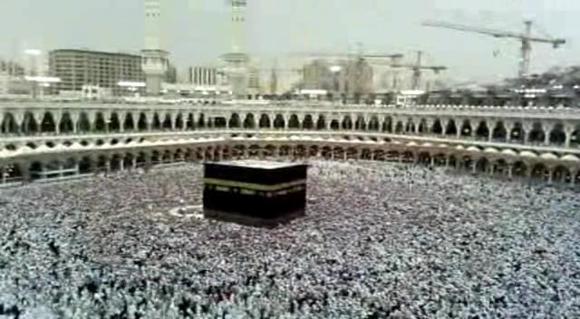Pilgrims prepare for feast of sacrifice
Lynne Nahhas
MUZDALIFAH, Saudi Arabia, Lynne Nahhas- Massive throngs of pilgrims on Thursday headed for the town of Muzdalifah to collect stones for the final ritual of the Muslim hajj which marks the first day of Eid al-Adha, the feast of sacrifice.
Men, women and children from 189 countries flooded roads linking Mount Arafat, where they had spent the peak hajj day in prayer and reflection, to Muzdalifah.

While many came by bus or used the Mashair Railway track linking the three holy sites of Arafat, Muzdalifah, and Mina, hundreds of thousands were on foot.
Some carried small children on their shoulders while others pushed elderly pilgrims on wheelchairs.
Cars, buses and the avalanche of humans -- men in white "Ihram" shrouds and women covered from head to foot except for their hands and faces -- all moved together as police and ambulance sirens sounded into the early evening.
A massive security presence had the near impossible task of controlling the chaos caused by the simultaneous movement of upwards of 2.5 million people towards the same destination.
On Wednesday, believers had converged on the plain of Mount Arafat for the most important ritual of the five-day hajj.
According to Mecca governor Prince Khaled al-Faisal, around 1.7 million people travelled from abroad for the pilgrimage, many of them from Middle Eastern countries which have been shaken by Arab Spring uprisings.
At noon prayers in Namira mosque at Arafat on Thursday, Saudi Arabia's Grand Mufti Sheikh Abdul Aziz bin Abdullah al-Sheikh warned pilgrims against using any "national or extreme slogans" during their stay in the kingdom.
He also criticised those who "nowadays call for a civil democratic state not linked to Islamic law and which acknowledges many forbidden acts... This contradicts the teachings of Islam as well as the Koran, Sunnah and Islamic sharia" law.
"Our Muslim world is facing sedition, tragedies, and bloodshed," he said, calling on people and leaders to "work on dialogue... end bloodshed, not resort to the use of arms," and not to implement "foreign" agendas.
But on the vast plain surrounding Mount Arafat, the prayers of pilgrims had reflected the instability sweeping across the region.
"God destroy Bashar," prayed one 30-year-old, referring to Syrian President Bashar al-Assad, as he stood atop the "Mount of Mercy" on Arafat plain.
His mother nudged him nervously, urging him to keep quiet: "Now regime troops will kill our whole family back home" in Syria's northern Idlib province, swathes of which -- but not all -- are under rebel control.
The focus of Thursday's rituals was where the Prophet Mohammed is believed to have delivered his final hajj sermon before his death.
In the crowds, Syrian worshippers were seen carrying a large rebel flag, a symbol of the 19-months-long deadly uprising against Assad's regime in which activists say more than 35,000 people have died.
The Syrian government did not send any pilgrims this year, but hajj visas were granted to Syrian refugees in Jordan and Lebanon.
Speaking from the same spot, Musleh Ramdan, a Syrian who had come from Jordan with 190 other refugees, echoed the prayers. "I came to call for the end of Bashar and the end to the killing of children."
Libyan Ruqaya al-Fayturi, 58, told AFP she was praying for "security and stability in Libya and all other Arab and Muslim countries."
The region was hit by a wave of uprisings that began in 2010, toppling autocrats in Tunisia, Egypt, Libya and Yemen. In Syria, meanwhile, the once peaceful mass protests against Assad have degenerated into bloody civil war.
For Mai, a 34-year-old Egyptian, the hajj is a "gift" from God that she will use to pray for "victory and peace in Egypt and all Muslim countries," she said.
Jalal, a Yemeni, said he was "praying for the return of peace to Yemen."
The hajj is one of the five pillars of Islam that every capable Muslim must perform at least once if able to do so.
More than 100,000 members of the security and civil defence forces have been deployed to ensure the safety of the pilgrims, while some 3,000 CCTV cameras have been installed across hajj sites.
----------------------------------------------------------------------------------------------------